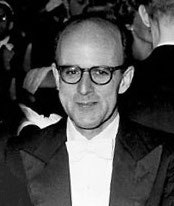Max Perutz
Max Ferdinand Perutz OM CH CBE FRS (19 May 1914 – 6 February 2002) was an Austrian-born British molecular biologist, who is best known for his work on the structure of hemoglobin, the protein in red blood cells that carries oxygen. His research in this area was pivotal in the development of molecular biology. Perutz's work not only deepened the understanding of the biochemical basis of life but also had profound implications for medical research, particularly in the treatment of blood diseases.
Early Life and Education[edit | edit source]
Max Perutz was born in Vienna, Austria, into a Jewish family. Despite the challenges of pursuing a scientific career in a period marked by economic instability and the rise of anti-Semitism, Perutz was determined to study chemistry. He moved to England in 1936 to attend the University of Cambridge, where he joined the Cavendish Laboratory. It was here that he began his lifelong work on the structure of proteins, particularly hemoglobin.
Career and Research[edit | edit source]
At Cambridge, Perutz became part of a vibrant community of scientists who were pioneers in the field of molecular biology. In 1947, he founded the Medical Research Council (MRC) Unit for Molecular Biology at the university. This unit became a leading center for molecular biology research worldwide. Perutz's early work involved using X-ray crystallography to determine the structure of proteins. This technique allowed scientists to visualize the arrangement of atoms within a protein molecule, providing insights into how proteins function. Perutz's most significant achievement came in 1959 when he and his team determined the molecular structure of hemoglobin. This work was groundbreaking because it showed, for the first time, how a protein's structure is related to its function. Understanding the structure of hemoglobin has had enormous implications for medicine, including the treatment of sickle cell anemia and other blood disorders.
Awards and Honors[edit | edit source]
Max Perutz's contributions to science were recognized with numerous awards and honors. In 1962, he was awarded the Nobel Prize in Chemistry, along with John Kendrew, for their studies of the structures of globular proteins. Perutz was also a recipient of the Copley Medal and the Royal Medal of the Royal Society. He was made a member of the Order of Merit, one of the highest honors that can be bestowed by the British monarch.
Legacy[edit | edit source]
Max Perutz's legacy extends beyond his scientific achievements. He was a passionate advocate for science communication, believing that scientists have a responsibility to share their knowledge with the public. He was also committed to supporting young scientists, particularly in the field of molecular biology. Perutz's work laid the foundation for numerous advances in biology and medicine. His pioneering use of X-ray crystallography opened up new avenues for understanding the molecular basis of life. Today, the techniques he developed are used to study a wide range of biological molecules, from enzymes to DNA.
Selected Publications[edit | edit source]
- Protein Structure: New Approaches to Disease and Therapy (1989)
- I Wish I'd Made You Angry Earlier: Essays on Science, Scientists, and Humanity (1998)
See Also[edit | edit source]
Search WikiMD
Ad.Tired of being Overweight? Try W8MD's physician weight loss program.
Semaglutide (Ozempic / Wegovy and Tirzepatide (Mounjaro / Zepbound) available.
Advertise on WikiMD
|
WikiMD's Wellness Encyclopedia |
| Let Food Be Thy Medicine Medicine Thy Food - Hippocrates |
Translate this page: - East Asian
中文,
日本,
한국어,
South Asian
हिन्दी,
தமிழ்,
తెలుగు,
Urdu,
ಕನ್ನಡ,
Southeast Asian
Indonesian,
Vietnamese,
Thai,
မြန်မာဘာသာ,
বাংলা
European
español,
Deutsch,
français,
Greek,
português do Brasil,
polski,
română,
русский,
Nederlands,
norsk,
svenska,
suomi,
Italian
Middle Eastern & African
عربى,
Turkish,
Persian,
Hebrew,
Afrikaans,
isiZulu,
Kiswahili,
Other
Bulgarian,
Hungarian,
Czech,
Swedish,
മലയാളം,
मराठी,
ਪੰਜਾਬੀ,
ગુજરાતી,
Portuguese,
Ukrainian
Medical Disclaimer: WikiMD is not a substitute for professional medical advice. The information on WikiMD is provided as an information resource only, may be incorrect, outdated or misleading, and is not to be used or relied on for any diagnostic or treatment purposes. Please consult your health care provider before making any healthcare decisions or for guidance about a specific medical condition. WikiMD expressly disclaims responsibility, and shall have no liability, for any damages, loss, injury, or liability whatsoever suffered as a result of your reliance on the information contained in this site. By visiting this site you agree to the foregoing terms and conditions, which may from time to time be changed or supplemented by WikiMD. If you do not agree to the foregoing terms and conditions, you should not enter or use this site. See full disclaimer.
Credits:Most images are courtesy of Wikimedia commons, and templates, categories Wikipedia, licensed under CC BY SA or similar.
Contributors: Prab R. Tumpati, MD



